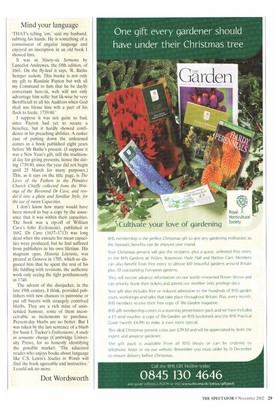Mind your language
`THAT's telling 'em,' said my husband, rubbing his hands. He is something of a connoisseur of angular language and enjoyed an inscription in an old book I showed him.
It was in Ninety-six Sermons by Lancelot Andrewes, the fifth edition, of 1661. On the fly-leaf it says, R. Bathe Semper eadem. This booke is not only my gift to Randale Payton but wth all my Command to him that he be daylly conversant here-in, wch will not only advantage him selfe; but lik-wise be very Benifficiall to all his Auditors when God shall soe blesse him wth a part of his flock to feede. 1739/40: I suppose it was not quite so bad, since Payton had yet to secure a benefice, but it hardly showed confi dence in his preaching abilities. A rasher case of putting down the unlearned comes in a book published eight years before Mr Bathe's present. (I suppose it was a New Year's gift, still the tradition al day for giving presents, hence the dat ing 1739/40, since the year did not begin until 25 March for many purposes.) This, as it says on the title page, is The Lives of the Fathers in the Primitive Church Chiefly collected from the Writ ings of the Reverend Dr Cave, and render'd into a plain and familiar Style, for the use of mean Capacities.
I don't know how many would have been moved to buy a copy by the assur ance that it was within their capacities.
The book was a rip-off of William Cave's folio Ecclesiastici, published in 1682. Dr Cave (1637-1713) was long dead when the extracts for mean capacities were produced, but he had suffered from publishers in his own lifetime. His magnum opus, Historia Literaria, was pirated at Geneva in 1705, which so dis gusted him that he spent the rest of his life fiddling with revisions, the authentic work only seeing the light posthumously in 1740.
The advent of the dustjacket, in the late 19th century, I think, provided pub lishers with new chances to patronise or put off buyers with strangely contrived blurbs. They are a rich mine of unin tended humour, some of them incon ceivable as incitements to purchase. Present-day blurbs are no better. But I was taken by the last sentence of a blurb for Susie I. Tucker's Enthusiasm: A study in semantic change (Cambridge Univer sity Press), for so honestly identifying the possible market: The educated reader who enjoys books about language like C.S. Lewis's Studies in Words will find the book agreeable and instructive.' I could ask no more.
Dot Wordsworth


















































































































 Previous page
Previous page